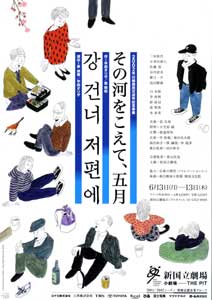|
|
 |
| Across the River in May THE PIT Event in 2002 commemorating Year of Japan-South Korea National Exchange |
| <STAFF> | |||||||||||||||||||||||||||||
| |||||||||||||||||||||||||||||
| <CAST> | |||||||||||||||||||
|
|||||||||||||||||||
| <PERFORMANCES> | |||||||||||||||||||||||||||||||||||||
Doors will open 45 minutes before the start of each performance. Please understand entries will be restricted during the performances. |
|||||||||||||||||||||||||||||||||||||
| <ADVANCE TICKETS> | |
| Available from Saturday 13 April, 2002 at 10:00am. To order tickets, please call +81-3-5352-9999 (10:00am-6:00pm). Internet ticket reservation available through the following Websites.(Japanese only) http://t.pia.co.jp/ http://eee.eplus.co.jp/ |
|
| <TICKET PRICES> | |||||||
50% discount is available for foreign tourists purchasing on the performance day. Please show your passports at the Box Office. Please also refer to New National Theatre News. |
|||||||
Hirata Oriza, who has studied in Seoul, says: "A Japanese living in Seoul for a year is forced to ask himself 'What does it means to be Japanese?' 24 hours a day for 365 days." Ever since studying in Seoul, Hirata has continued grappling with the issue of "Japan and South Korea," but this is the first time he takes up the theme "Japan and Korea today" with emphasis on the word "today." The cast consists of six performers from Japan, headed by Mita Kazuyo, and five from South Korea, including LEE, Ou-Soon E. On stage, they will act as Japanese and Koreans who, under their own circumstances, meet in Seoul, in spring 2002. What will emerge from the combination of clash of cultures and the lack of proper communication? Japan and South Korea will co-host the 2002 World Cup soccer championship, and this year has been designated the Year of Japan-South Korea National Exchange. Therefore many plans designed to promote bilateral exchanges are being undertaken between the two countries on a scale never seen before. In the field of drama, exchanges are already taking place in various forms between Japanese and South Koreans. However, in terms of Japan-South Korea exchange as well as of international joint production, for Japan and South Korea to be engaged in a joint undertaking where actors from the two countries perform on the same stage is almost unprecedented. In this production, actors speak both Japanese and Korean on stage. Come see the show and experience the fun and surprise generated when two cultures meet. One of the highlights of the production is the costumes and props brimming with the "Koreanesque" of South Korea today. This year a new page will be added to the history of our two countries, and many Japanese will experience the joy of encountering South Korea and its unique culture. This will be a golden opportunity to feel the pulse of today's Japan and Korea. At the dry riverbed of Hang-gang, in the spring of 2002. KIM, Mun-Ho teaches at a Korean language school. Kim is a first son and is single. His dream is to become a novelist. Today he is taking his family and students on a picnic. His younger brother, KIM, Jae-Ho, a tired and busy salaried worker, is planning to emigrate to Canada with his wife, but hasn't told his mother about it, knowing that she would oppose. He thought he would tell her about his plans during the picnic. Kim„fs Japanese students who joined the picnic are of various ages and occupations. They include a woman whose husband was transferred to South Korea, a young man who hated his school in Japan so much that he opted to come to Seoul, a salaried man working for a large office supply maker, a Korean resident in Japan whose goal is to become an Olympian swimmer and his lover, and a young man who is traveling around the world while working as a part-time worker. The picnic started as people began to show up bit by bit. A honeymooning couple from Japan strays into the picnickers. The sight of people trying to communicate with each other despite the fact that they do not speak the same language echoes the historical relationship between Japanese and Koreans, the bonds of family, the issue of ethnic Koreans in Japan, mixed marriages, attitudes towards the State, differences in custom, and the empathetic human ties that transcend ethnicity. The production cuts out a scene from the dry riverbed where Seoul residents are said to gather, and from their conversations, which include a lot of hellos and good-byes, captures fragments of "Japan and Korea today." |
